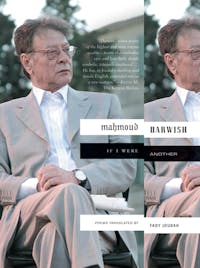If I Were Another
Poems
 Download image
Download image
ISBN10: 0374532478
ISBN13: 9780374532475
Trade Paperback
240 Pages
$23.00
CA$25.00
Winner of the PEN USA Literary Award for Translation
Mahmoud Darwish was that rare literary phenomenon: a poet both acclaimed by critics as one of the most important poets in the Arab world and beloved by his readers. His language—lyrical and tender—helped to transform modern Arabic poetry into a living metaphor for the universal experiences of exile, loss, and identity. The poems in this collection, constructed from the cadence and imagery of the Palestinian struggle, shift between the most intimate individual experience and the burdens of history and collective memory. Translated by Fady Joudah, If I Were Another—which collects the greatest epic works of Darwish's mature years—is a powerful yet elegant work by a master poet and demonstrates why Darwish was one of the most celebrated poets of his time and was hailed as the voice and conscience of an entire people.
Reviews
Praise for If I Were Another
"A world-class poet . . . Darwish has not only remade a national consciousness; he has reworked language and poetic tradition to do so."—Fiona Sampson, The Guardian (UK)
"[Darwish] writes poetry of the highest and most intense quality—poetry that embodies epic and lyric both, deeply symbolic, intensely emotional . . . He has, in Joudah's startling and tensile English,expended into us a new vastness."—Kazim Ali, The Kenyon Review
"[Darwish's] best political poetry, because it is love poetry, is uncannily intimate . . . At timesit is frankly mystical, imagining a union that recalls the rapt ecstasies of Sufi aints."—Robyn Cresswell, Harper's Magazine
"Poetry for Darwish provides not simply an access of unusual insight or a distant realm of fashioned order, but a harassing amalgam of poetry and collective memory, each pressing on the other . . . The conventional and the ethereal, the historical and the transcendently aesthetic combine to provide an astonishingly concrete sense of going beyond what anyone has ever lived through in reality."—Edward Said, Grand Street
"Here we have in one glorious volume the reach and the depth of Darwish's lyric epics that individually, repeatedly, and cumulatively shifted our understanding of what poetry can accomplish. In his lucid and compelling translations, Joudah offers us a gesture of unequaled fraternity in lines that mirror and move in loyalty to the birth of new poems."—Breyten Breytenbach, author of All One Horse
"No poet in our time has confronted the violent tides of history with greater humanity or greater artistic range than Mahmoud Darwish. This collection, masterfully edited and translated by Fady Joudah, bears witness to the unceasing development and deepening of Darwish's practice over the last two decades of his life. Here the lyric, the elegiac, and the epic conjoin in one voice encompassing self and other, desire and memory, the olive's tang and the ashes of exile."—Michael Palmer, author of Company of Moths
"This second volume by the late, great Palestinian poet Darwish (1941–2008) to be translated by Palestinian-American doctor/poet Joudah comprises four nonconsecutive books of longer poems spanning 1990 to 2005. These works follow Darwish's poetic development from a historically focused middle period to the devastatingly personal lyric-epic of his late style. Formally varied—Rubaiyats alternate with sprawling free-form poems, in which prose paragraphs meet both long and short verse lines—Darwish's Sufi-inspired poetry probes, admires, describes, longs for and questions. His subjects are often broad: the inheritance and disinheritance of lands, languages and histories. Sometimes, though, he turns to concrete need, confessing, for example, in ‘Mural,' his book-length poem about a brush with death: ‘I want to walk to the bathroom/ on my own.' But Darwish's poems are at their most singular and powerful when he collapses the boundaries between great and small concerns, as when he articulates, ‘Wars teach us to love detail: the shape of our door keys,/ how to comb our wheat with eyelashes and walk lightly on our land.' The stakes of this work—for Darwish and for his readers—are clear: ‘O my language,/ help me to adapt and embrace the universe.'"—Publishers Weekly (starred review)
"Steeped in the tradition and values of classical Arabian poetry and yet contemporary, fluid, and conversational, Darwish's work has enjoyed both critical acclaim and widespread popularity. His poems are couched in imagery and cadences that evoke the Palestinian struggle, touching on such universal experiences as exile, loss, and identity ('Water, be a string to my guitar. The new conquerors have arrived/ and the old ones have gone. It is difficult to remember my face/ in mirrors. Be my memory that I may see what I have lost'). While writing from under the burden of history and collective memory, Darwish also details the personal and everyday in an individual's life. His language is powerful, memorable: 'Rita cracks the walnut of my days, and the fields expand/ and this small earth becomes mine.' Arguably the voice and conscience of the Palestinian people, Darwish died in 2008 and at the time was considered one of poetry's few international superstars. Highly recommended."—Louis McKee, Painted Bride Arts Center, Philadelphia, Library Journal


